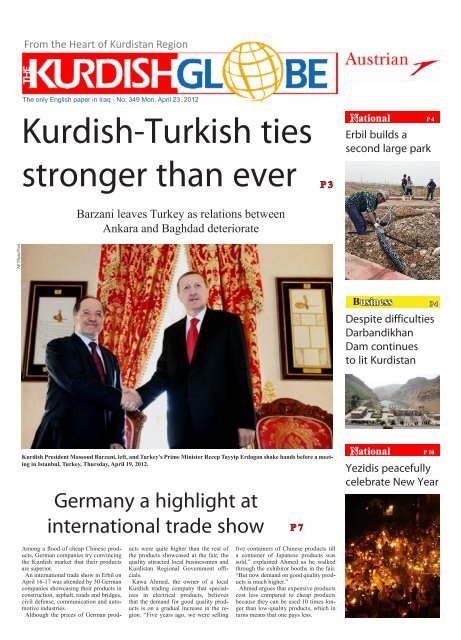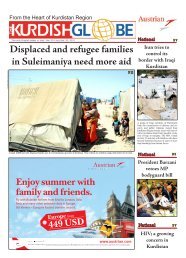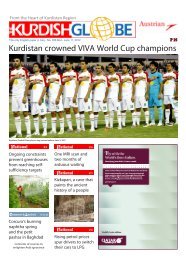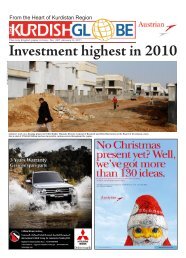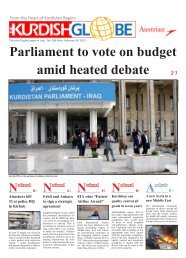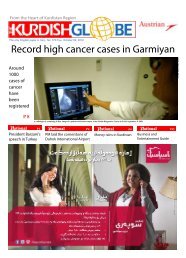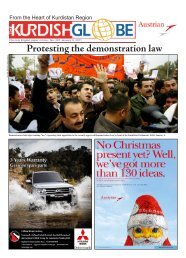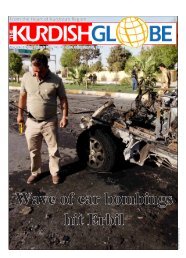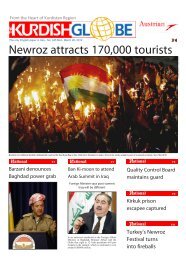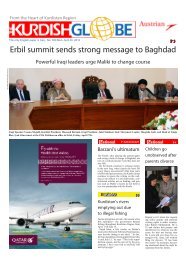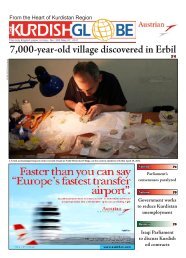Kurdish-Turkish ties stronger than ever - Kurdish Globe
Kurdish-Turkish ties stronger than ever - Kurdish Globe
Kurdish-Turkish ties stronger than ever - Kurdish Globe
You also want an ePaper? Increase the reach of your titles
YUMPU automatically turns print PDFs into web optimized ePapers that Google loves.
The <strong>Kurdish</strong> <strong>Globe</strong> No. 349, Monday, April 23, 2012 2Gap widens between Erbil and Baghdad amidst lack of <strong>Kurdish</strong> unity<strong>Globe</strong> EditorialPrior to Kurdistan Region Presidudent Massoud Barzani’s visit tothe U.S. and a number of Europeauan and <strong>Turkish</strong> capitals, relationsbetween Erbil and Baghdad werestretched to a breaking point. Barzuzani, during his speeches at Newuwroz and other occasions, openlyaccused Iraq Prime Minister NouriAl-Maliki of being a dictator andcomplained of lack of intentionby Iraqi political actors to resolvepending issues between Erbiland Baghdad according to Iraq’spermanent constitution. Barzaniwarned that unless an urgent solulution was found, he would returnto his people to decide which pathto follow. Such a warning wasrightly interpreted by many as acall for independence.It is now well known that thevital issues between Erbil andBaghdad resonate around dispuputed areas including oil-richKirkuk, the hydrocarbon law,power-sharing, and the status ofPeshmerga forces. Maliki’s reactutions to Barzani’s remarks and theIraqi Oil Ministry’s stance againstthe global oil giant, Texas-basedExxonMobil, on the issue of oilexploration contracts with theKRG indicate that relations betutween the two capitals may havealready passed return.In an interview with a <strong>Kurdish</strong>newspaper, Awena (Mirror) IraqiPM Maliki implicitly accused the<strong>Kurdish</strong> leaders of smuggling oiloutside the country and puttingtheir personal interests before the<strong>Kurdish</strong> people. He denied thecharges that he established a dictutatorial rule in Baghdad, sayingthat Kurds occupy high-rankingposts in various government estutablishments including the army.Maliki’s implicit accusationsagainst Barzani and his aides asgang and mafia are indicative ofthe huge pressure that Barzanihad on Maliki as his premiershipmostly deepens on his alignmentwith the <strong>Kurdish</strong> Bloc in IraqiParliament.While Maliki took a battle positution, the Iraqi Ministry of Oil tooka sharp stance against ExxonMobubil last Thursday. The Iraqi OilMinistry stated that ExxonMobilCorp. is not allowed to bid in theIraqi Prime Minister Nuri al-Maliki talks to an unidentified official duringthe opening session of the first Arab summit to be held in Iraq in 22 yearson March 29, 2012.May energy auction due to itsdeals with the KRG. ExxonMobilsigned contracts with the Ministutry of Natural Resources of theKRG last October to search foroil in six blocks, bypassing thecentral government in Baghdad.The deputy head of the Oil Miniuistry's Licensing and PetroleumContracts Department, Sabah al-Saidi, told The Associated Pressthat the reason for the move wasExxon's refusal to relinquish itsdisputed deals with the Kurds:"Exxon has been removed fromthe list of qualified companiesbecause it refused to abandon thedeals with the <strong>Kurdish</strong> region asrequested by the Ministry of Oil."Baghdad insists that all the oildeals with KRG must be ratifiedby Baghdad first. The Kurds, onthe other hand, maintain that theIraqi Constitution grants the KRGto strike agreements with internatutional oil companies to explore oilin Kurdistan Region.Officials from Baghdad’s OilMinistry recently claimed thatExxon had sent two letters assuriuing that it would freeze the Kurdiuish deals until the central governmument and the Kurds resolve theirdifferences. But <strong>Kurdish</strong> authoritu<strong>ties</strong> have maintained that the contutracts are still valid and Exxon iscommitted to them.Baghdad’s decision to excludeExxon from participating in theenergy auctions this coming Maysuggest clearly that Exxon is commumitted to its deal with the KRG.While political tensions betutween the two capitals on theissue of disputed territories, oilexploration rights and others maybe considered internal affairs ofIraq, the growing strains betweenKurdistan Region and Iraq haveregional and international dimensusions as well. Rising political turmumoil in the Middle East, globalpower and hegemony strugglesover the region are forcing newalignments and positions amongstthe regional powers and forces.This can explicitly be seen in thecase of Syria. Due to the natureof <strong>Kurdish</strong> national question’s regugional and international character,the Kurds find themselves in theseregional and global conflicts.While KRG and Kurdistan’spresident have taken a clear positution regarding Syrian Kurds andagainst Basher al-Assad’s regimein Syria, Maliki--under the influeuence of Iran--supports the regimein Syria. The critical role that theSyrian Kurds can play againstthe regime and equally the criticucal role that the KRG has overthe Syrian Kurdistan Iran throughMaliki attempts to pressure KRGand distract its attention from Syriuian Kurdistan. Without doubt, behuhind Maliki’s bold stance againstKRG one can assume is Iran’sunambiguous support.Given the poor democratic histutorical background of Iraq sinceits inception and the rising regugional crisis, the relation betweenErbil and Baghdad is unlikely toAFP PHOTO/AHMAD AL-RUBAYEimprove. The cultural developmuments in Kurdistan, particularlyamong the young generation, areindicative of even bigger gaps betutween the Kurds and Arabs <strong>than</strong>the political gaps between the polulitical leaders. Unless ruled by aSaddam-like dictatorial regime,Iraq does not have any chance tosustain either its territorial integrurity or national unity. It is almostinevitable that Iraq has to be disiuintegrated into two if not threeseparate political enti<strong>ties</strong>.Massoud Barzani was absolulutely right to warn that a dictatorfrom Baghdad cannot rule Kurdiuistan, and if Baghdad attempts todo so the Kurds would go theirseparate way. The process has alruready begun and it is only matterof time and regional developmentto decide when and how it happupens. It has already begun amongthe people. The Kurds and Arabsare now two culturally and polulitically separate groups and mostimportantly they do not share acommon future and vision.The <strong>Kurdish</strong> political leadersand political enti<strong>ties</strong> should ratherprepare themselves for such ineuevitability. A separation from Iraqand establishment of an independudent Kurdistan needs courageousleadership and national unity inorder to face the challenges thatwill arise.A close reading of <strong>Kurdish</strong> polulitical discourse indicates, howeu<strong>ever</strong>, a rather grim picture onthe issue of national unity anda common vision. Despite theirstrategic agreement, the Kurdiuistan Democratic Party and thePatriotic Union of Kurdistan, thetwo powerful political groups insouthern Kurdistan, display contutradictory pictures in regard tothe discussion around the indepupendence of Kurdistan. MassoudBarzani, both the president ofKurdistan as well as president ofKDP, pushes forward for an indepupendent Kurdistan; Jalal Talabanuni, the Iraqi president and head ofPUK, portrays rather a pessimisticview regarding the independenceissue. This can be explicitly seenin a recent interview of PresidentJalal Talabani.During an interview with theQatar-based Al-Jazeera satellulite, Talabani said the independudence of Kurdistan in the nearfuture is ‘impossible.’ “Not onlyis independence not possible,but also now it is in the interestof the <strong>Kurdish</strong> people to remainwithin the framework of Iraq.” Inresponse to the question, ”Kurdiuistan is more powerful and moreprosperous now it seems <strong>than</strong> atany time in its history. What is thenext step?” Talabani stated: “It’strue that we [in Kurdistan] havethe right of self-determination,but we use these rights to servethe Iraqi democratic system.”More interestingly when thejournalist asked “what happensthen, for all those young peoplein particular, who want an indepupendent Kurdistan – who don’tsee a future in Iraq? When youlook around Kurdistan – partuticularly with the new generation– they don’t learn Arabic, theydon’t seem to feel much connectution with the rest of Iraq. Whatis there still that <strong>ties</strong> the <strong>Kurdish</strong>region to Iraq?” President Talulabani answered: “You know thisera, this century, is not the era ofsmall countries; it is [an era] ofbig unions. Look to Europe, theyare trying to reunite. So it is withiuin the framework of a democraticfederal Iraq that we are engagingin all activi<strong>ties</strong>, and we have allkinds of freedom and we have allpossibili<strong>ties</strong>, but we must be reaualistic. A politician who wants toserve his people must lead peoplein a way that serves their intereuests.”Talabani’s remarks are highlysubjective and require far moreprofound analysis <strong>than</strong> this editorurial as we see the global trend thatwitnesses the establishment ofnew independent states, and regugarding the issue of ‘small’ countutry survival, a call for measuringBosnia with Kurdistan in terms ofpopulation and territorial size isrequired.Despite the fact that such remumarks by Talabani are not newand indicate a general outlook ofTalabani, nonetheless the contextof the interview at such a sensitutive time and the Kurdistan presidudent’s remarks regarding <strong>Kurdish</strong>independence can be interpretedas a lack of political nationalunity and vision. At such criticalperiod the Kurds must develop acoherent strategic national policyin order to face the crushing forceues that challenge the Kurds.Azad AminWeekly paper printed in ErbilFirst published in 2005www.kurdishglobe.netinfo.kurdishglobe@gmail.comAddress:Erbil, Bakhtiyari QuarterEXECUTIVE EDITORJawad QadirEDITORAzad Aminazad.kurdishglobe@gmail.comSenior U.S. EditorSuzanne DeRouensuzi.kurdishglobe@yahoo.comSenior U.K. EditorBashdar Pusho Ismaeelbashdar@hotmail.comAko Muhammed+964 750 4661936ako.kurdishglobe@gmail.comAiyob Mawloodi+964 750 4776905aiyob.kurdishglobe@gmail.comQassim Khidhir+964 750 4823081qassim.kurdishglobe@gmail.comSTAFF WRITERSSazan M. Mandalawisazan.kurdishglobe@gmail.comZakaria Muhammed+964 750 475 3897zakaria.kurdishglobe@gmail.comRawaz Koyee+964 750 1163296rawaz26.kurdishglobe@gmail.comARTS EDITORDiyaco Qayoumy +964 750 4036252diyaco.kurdishglobe@gmail.comAdvertisementFor information and prices of ad spots, please contact<strong>Globe</strong>’s Advertisement section: Rizgar Yahyarizgar.kurdishglobe@gmail.comCell: +964 750 4055888You can also check prices and packages by loggingon to: kurdishglobe.net/adSubscriptionThe <strong>Kurdish</strong> <strong>Globe</strong> can be delivered to your office orhome address, whether in Kurdistan or abroad.To subscribe: Please contact the <strong>Globe</strong> DistributionSection: Rauf Aspindarairauf.kurdishglobe@gmail.com+964 750 4497976You can also subscribe by logging onto:kurdishglobe.net/subscription
The <strong>Kurdish</strong> <strong>Globe</strong> No. 349, Monday, April 23, 2012 3<strong>Kurdish</strong>-<strong>Turkish</strong> <strong>ties</strong> <strong>stronger</strong> <strong>than</strong> <strong>ever</strong>Ankara says Iraqi PM too “self- centred” to lead the countryAP Photo/Murat CetinmuhurdarIn this photo provided by <strong>Turkish</strong> Presidency Press Service, President Abdullah Gul, left, greets Iraqi <strong>Kurdish</strong> Regional leader Massoud Barzani, before a meeting in Ankara, Turkey, Friday, April 20, 2012.Barzani meets withhighest-rankingofficials duringtwo-day visitto Turkey.After concluding a tourof Europe and the Uniteued States started in lateMarch, Kurdistan RegionPresident Massoud Barzuzani arrived in Turkey onApril 29 as his last stopbefore returning to Kurdiuistan.President Barzani metwith Turkey’s highestrankingofficials, includiuing President AbdullahGul, Prime Minister Recucep Tayyip Erdogan andForeign Minister AhmetDavutoglu.<strong>Turkish</strong> media describedthe visit and meetings as"very important" eventsin the history and futureof <strong>Kurdish</strong>-<strong>Turkish</strong> relatutions.During the first day ofhis visit, Barzani met withPrime Minister Erdoganand reiterated improvingpolitical and economicrelations between the twocountries.The two-hour meetingwas held in the PrimeMinister’s office in Istutanbul, and was also attutended by the head ofKurdistan Region Protutection Agency, MasrourBarzani, and KurdistanPresidency’s Chief ofStaff, Dr. Foad Hussein,and National IntelligenceOrganization (MIT) exeuecutive Hakan Fidan,Deputy Prime MinisterBesir Atalay, and DeputyForeign Minister Fereydudun Sinirlioglu from the<strong>Turkish</strong> side.During the meeting,both sides agreed thatthey need to improvetheir bilateral relations inpolitical, economic andcultural aspects. Theyalso discussed the currentpolitical situation in Iraqand the obstacles in frontof the political process inthe country.Both leaders discussedthe situation of neighbuboring Syria and theiropinions about the Syriuian opposition. Barzanireiterated in the meetingthat the rights of SyrianKurds should be recognunized. He also explainedto Erdogan the purposeand results of his tour toEurope and the U.S.While discussing thecurrent situation in Iraq,the <strong>Turkish</strong> PM criticizedhis Iraqi counterpart Nurial Maliki and describedhis actions as fueling sectutarian conflicts among theKurds, Shiites and Sunnunis of the country. Erdogugan said that this resultedfrom unilateral decisionsand bad behavior with hispartners in governing thecountry."The current prime miniuister's treatment towardhis coalition partners,his egocentric approachwithin Iraqi politics...seriously concern Shiitegroups, Mr. Barzani andthe Iraqiya group,” saidErdogan during a postmeetingpress confereuence.Erdogan told reportersthat the events in Iraq donot have positive indicatutions, especially what isrelated to the "attitude"of the current Iraqi PrimeMinister toward his partnuners in power. He alsoadded that Maliki’s "behuhavior" has raised concucerns among Kurds, Shiiuites and other politicalgroups in the country.In a reactionary statemument one day after Erdogugan’s meeting with Barzuzani, PM Maliki said onFriday that Turkey is becucoming a "hostile state"in the region, accusing itsprime minister of interfufering in internal Iraqi affufairs and of sectarianism."The latest statementsof Erdogan are anotherreturn to the process ofinterfering in Iraqi internunal affairs and it confirmsthat Mr. Erdogan is stillliving the illusion of regugional hegemony," Maluliki said in a statementposted on his website."It is regrettable that hisstatements have a sectariuian dimension which heused to deny before butthat has become clear andis rejected by all Iraqis,"Maliki said.On the second day of thevisit, Barzani met withhis counterpart, PresidentGul, and Foreign Ministuter Davutoglu. The meetiuing was centered aroundpolitical situations in Iraqand the region in generaland future prospects inthis regards.Both presidents discucussed bilateral <strong>ties</strong> andvowed to improve themin a way that is mutuallybeneficial for the peopleof the two countries.Another topic of themeeting was the <strong>Kurdish</strong>issue in Turkey, whereboth sides discussed possusible solutions.“The <strong>Turkish</strong> governmument has taken positivesteps in the past few yearsand these acts shouldbe continued and develouoped,” said Barzani, addudressing the <strong>Kurdish</strong> issusue in Turkey.While emphasizing thatdialogue is the only solutution for this and any othersuch issues, the <strong>Kurdish</strong>President refuted reportsclaiming that he has reququested PKK to abandonarms or that he has promiuised to act as a mediatorbetween PKK and Turkukey in Qandil, but statedthat arms don’t solve the<strong>Kurdish</strong> issue and otherways should be used inthis regard.Addressing the Kirkukissue and its future, Barzuzani said, “Kirkuk peoplewill decide their futureby themselves.”During the visit, the<strong>Kurdish</strong> delegationalso met with Selahattutin Demirtaş and GültanKışanak, co-chairmansof the Peace and Democruracy Party (BDP) as wellas Ahmet Turk, a Kurdiuish member of <strong>Turkish</strong>Parliament.Barzani also met withIraqi Vice President Tariqal Hashemi, who is currurently in Turkey after hevisited a number of Gulfcountries.Hashemi announced,after his meeting withKurdistan Region’s Presiuident in Istanbul, thattheir meeting was mainlyabout internal politicaldevelopments in Iraq,Hashemi’s recent meetiuings with Gulf countries’authori<strong>ties</strong>, KurdistanRegion’s Europe andU.S. tour as well as hismeeting with the <strong>Turkish</strong>Prime Minister.Barzani concluded histour at Turkey and arrivedat Erbil International Airpuport on Friday, April 20,where he was received bya large number of highrankinggovernment offuficials.
The <strong>Kurdish</strong> <strong>Globe</strong> No. 349, Monday, April 23, 2012 4Erbil builds a second large parkGLOBE PHOTO/Ako MuhammedPark completion occurringone stage at a timeA large block of land near Bnaslawa used for grazing sheep willsoon become one of Erbil’s prime recreation areas.Four worker of Dosti company install electricity network in Hewar project, Bnaslawa, Erbil.Hassan Ali Kirkukiguards and feeds his flockof sheep inside a fencedinpasture; he takes themback to a settlement <strong>ever</strong>ynight and noon. He usesthis pasture temporarilybecause he will soon sellhis sheep all together,but he also knows thisfenced-in pasture nearBnaslawa and east ofErbil will soon becomeHewar Park, somethingthat will be "useful forthe neighborhood."The pasture will betransformed into a parkin s<strong>ever</strong>al stages. Thecurrent fence covers520,000 square meters;thus, it will be the secouond largest park west ofErbil--eight times bigger<strong>than</strong> Shanadar Park indowntown Erbil.Work is now ending onthe first part of HewarPark, which accounts for40% of the land. Bnaslauawa’s old and new roadssurround the park on bothsides and a dry streamsplits the park from thetown's residential areas.On the other side of thepark is a power station.From the inside gate,the park is divided intotwo by two main pathsthat will soon be aspuphalted. The executivecompanies, Dosti andthe <strong>Turkish</strong> EDA, arecurrently installing electutricity and irrigation netwuworks that are knee-levelunderground and deeperin some areas.Areas between the maintwo paths and upward tothe power station consusist of clean soil. Butdownward to the stream,the soil is mostly stone.Project supervisors don’tconsider the stony soila roadblock to growingflora.The shepherd Kirkukithinks that eucalyptustrees can survive in thearea. “The stony soilcould be much better<strong>than</strong> the red dirt," saysKirkuki, stressing theimportance of good irrigugation and fertilization.He owned an orchardin Shwan, near Kirkuk,before he was deportedto Bnaslawa in the late1980s. As for other treesthat are new in Kurdistutan--the same ones to beplanted in the park--heisn’t as sure of their usefufulness.The agricultural supervuvisor of the project, enginuneer Hawkar Dilshad, assusured that the stony soilwould not cause growthproblems since they--theDirectory of Erbil Parks--committed the execututive companies to addinga 25-centimeter layer ofclean soil to some limitedlocations inside the park.Another 15-centimeterlayer of agricultural sandmust be added to all ofthe land.These layers "will totutally solve the problemfor grasses that will beplanted," says the enginuneer. "As for the trees,they will be planted indigs that are also filledwith clean soil and fertiliuizers."Currently the addedlayers are less <strong>than</strong> 15 oreven 10 centimeters; insome places it is thicker<strong>than</strong> standard. Head ofthe supervising commumittee, engineer HiwaAhmed, does not consideuer the thin layer as sometuthing that was overlookedby the companies, and henotes "the project hasn’tyet been completed."As planned, 600 eucucalyptus trees will beplanted around the park,according to informatution by the agriculturesupervisor. Melia Azedudarach will become themost frequent type with800 trees. Two-hundredBrachychiton Populeumtrees and 300 CuperssusArizonica trees will beplanted as well, mostlybeside the pathways.These types of trees, excucept for eucalyptus, arenot indigenous to Kurdiuistan Region; regardless,they have been used a lotrecently and have grownas expected during allfour seasons.Yards will becomegreen with Iranian andLebanese flowers as wellas lawn grass. The areabetween the two mainpaths will be planted withBermuda grass, which remumains green year-round.The cornerstone of thispark—which will havedetails like fountains andplay areas—was laid onDecember 27, 2010. Abudget of 2 billion Iraqidinars helped to compuplete the first stage inone year. Last year, anextra budget of 1 billion,400 million--as well aslengthening the durationfor completion--was suggugested for the project.Stage two has not yetbeen completed.Director of Erbil Parks,Nizar Omer, explains thedelay is mainly becauseof two electricity lines, a11 KV cable and a 33 KVcable, going under thepark to nearby power statutions. They caused a "bigproblem" for the sewauage and pathways, saysOmer. “We first didn’tknow they were there.We had twice announceda project to transformthose cables, but no compupany applied because thededicated budget was sosmall. We could only liftthem after the third attutempt.”After an extension oftwo months, the companuny has asked for anotherthree months in order tocompensate for lost time.But basic work of the firststage including asphaltiuing walkways will endin two or three months,says Hiwa. Constructionof the park office, its gateand water storage is alruready underway.Planting will start inOctober, says Omer, whohopes for the park to be atleast partially opened forvisitors early next year."Hewar Park creates abalance of green areas inErbil. The big [Sami Abdudulrahman] park is locateued in the west and someother parks have beenbuilt downtown; thus,Erbil was in need of sucha big park in its easternsection," says Omer.The directory is currurently working on twoother "important" projeuects—a park on 40,000square meters in Badawa,also in eastern Erbil, andrenovation of GilkandPark next to Erbil Internunational Hotel in the citycenter.Thanks to the efforts ofthis directory, the rate ofgreen land in Erbil reacheues 6.5 percent, but theyaim for more. Increasiuing green lands is not thegovernment's responsibubility alone, says Omer.People must raise treestoo. "Home-building licucenses should contain acondition that 10 to 15square meters of gardensmust be built with houseues that are built on 200square meters," suggestsOmer, who believes thateven two trees in <strong>ever</strong>yhouse can effectively incucrease the green rate.Ako MuhammedErbilako.kurdishglobe@gmail.com
The <strong>Kurdish</strong> <strong>Globe</strong> No. 349, Monday, April 23, 2012 5Despite difficul<strong>ties</strong> Darbandikhan Damcontinues to lit KurdistanGLOBE PHOTO/Aiyob MawloodiPROFILE- Constructed in1983, but due to GulfWars of the 1980s and1990s, work was halteued on the dam s<strong>ever</strong>altimes. This has led tofrequent failures andtechnical problems.- Consists of threeturbines and powergeneration units witha capacity of 83 megawuwatts each.- The media has veryrarely addressed technunical issues and challulenges of the team.This photo depicts the Darbandikhan Power Station on the Darbandikhan Dam, south of Suleimaniya, March 14th.World Bank allocates 20 million USD to renovate the damTelling the story of theDarbandikhan Dam andits power station, a statution senior staff memberspeaking on the conditution of anonymity saysthat the project was tendudered to the JapaneseMitsubishi Corporationin the early 1980s. “Thetotal budget allocatedfor the project was $3.6billion; how<strong>ever</strong>, dueto some technical issusues, the budget wasdecreased later.” Andstation management belulieves that some of thetechnical issues the statution currently faces aredue to that budget cut.During the constructution period, work washeld up s<strong>ever</strong>al timesdue to war and unrest inthe country. MitsubishiCorp., the developer ofthe project, finally compupletely abandoned theproject and left the countutry in 1990 when theIraqi regime began theGulf War and a numberof the company’s staffwere detained. Afterthat, the company n<strong>ever</strong>returned to complete theunfinished job, even desuspite UNDPs efforts topersuade them. Mitsubisushi Corp. told UNDP thatdue to the loans owed tothe company by the Iraqigovernment, they wouldnot do that.Samad Yassin, the statution director, said in aninterview with the <strong>Globe</strong>that his team had to usewhat<strong>ever</strong> skills andequipment they retainedfrom the company tofinish the project in anyway possible, and <strong>than</strong>ksto their commitment,skills and hard work, thestation is now runningdespite technical issuesand difficul<strong>ties</strong> they facein sourcing spare parts.Recently, the WorldBank allocated some$40 million to renovateboth the Darbandikhanand Dokan dams. Thefunds are spent throughthe Kurdistan RegionalGovernment’s Ministryof Electricity to contractutors.“At the first phase, anItalian company wascontracted to repair andchange some parts of thestation that were obsolulete,” said Yassin as hewatched one of the unitsoperate loudly at fullcapacity. “One of thegood things they havedone was to change themanagement and controlsystem to a computeriuized system. A secondtender was given to acompany to renovate thedistribution network ofthe station.”Explaining that thecompany is about to begugin work on the networkssoon, Yassin complainedthat the budget allocatedfor the Darbandikhanstation is insufficient.“While Darbandikhan[station] has three unitsand Dokan [station] hastwo, the budget is equalluly shared between thetwo, which is not fair.”Yassin also explainedto the <strong>Globe</strong> that theyused to have an issue ofwaste of voltage, whichthey overcame by installiuing a syncro-condensersystem, which stabilizesthe voltage while savingwater: “It works on itsown without water.”Yassin, who has workedthere for 15 years, expuplained: “In the past wewere feeding 132 voltsto Kalar, but the townwas receiving only 125-128 volts, which was insusufficient.”According to Yassin,their local techniciansinstalled the syncro-condudenser system on theirown, which means thatthey have technicianswho deserve respect--and the <strong>Kurdish</strong> peopleshould respect their hardwork.How<strong>ever</strong>, Hussein Qadudir, another staff membuber at the station witha quarter century of expuperience there, says thatpeople do not think ofthem this way. “Governmument does not care aboutus, so what should weexpect from people?”asked Qadir. “They onlycare how many hours thestation generates power,and when<strong>ever</strong> there isa failure and the stationstops production, theyimmediately call and askabout the problem withouout thinking about thepeople behind this andthe efforts spent by theunselfish staff here.”The director and staffof the station compuplained that the ministutry does not care abouttheir lives, health orsafety, and does not listuten to their demands.N<strong>ever</strong>theless, they stillchoose to do their bestto provide a maximumamount of power supplyto the people and haven<strong>ever</strong> threatened to stopthe system or hold geneueration to force the miniuistry to respond to theirdemands.One other issue thatYassin complained aboutwas the excess numberof staff he has for thedu<strong>ties</strong> at the station. Heargues that he has more<strong>than</strong> double the numberof staff he actually needsto run the station. With158 staff members in hispayroll. “Another issueis a number of our staffare women who are notfit for the harsh situatution and heavy technicaldu<strong>ties</strong> the station demumands.”Aiyob MawloodiErbilaiyob.kurdishglobe@gmail.com
The <strong>Kurdish</strong> <strong>Globe</strong> No. 349, Monday, April 23, 2012 7Germany a highlight at international trade showGerman companies seek investments in health care, power and recyclingAmong a floodof cheap Chineseproducts, Germancompanies tryconvincing the<strong>Kurdish</strong> marketthat their productsare superior.An international tradeshow in Erbil on April16-17 was attended by30 German companiesshowcasing their productsin construction, asphalt,roads and bridges, civildefense, communicationand automotive industries.Although the prices ofGerman products werequite higher <strong>than</strong> the restof the products showcasedat the fair, the quality attutracted local businessmenand Kurdistan RegionalGovernment officials.Kawa Ahmed, the ownerof a local <strong>Kurdish</strong> tradiuing company that specialiuizes in electrical products,believes that the demandfor good quality productsis on a gradual increasein the region. “Five yearsago, we were selling fivecontainers of Chineseproducts till a containerof Japanese products wassold,” explained Ahmedas he walked through theexhibitor booths in thefair. “But now demand ongood quality products ismuch higher.”Ahmed argues that expupensive products costless compared to cheapproducts because they canbe used 10 times longer<strong>than</strong> low-quality products,which in turns means thatone pays less.“This is true for projectsas well,” added Ahmed.“A project is implementeued and completed. A fewmonths later it will berenovated and a year lateranother new project forthe same project is implemumented once again. Thegovernment allocated afew budgets for the sameproject instead of one budguget.”Tahir Abdulla, DeputyGovernor of Erbil, admitsthis reality and says thatmost of the time projectsfail due to their inferiorquality. “Companies compupeted for government tenduders based on price, andthe cheapest proposal isaccepted,” Abdulla toldthe <strong>Globe</strong> at the trade fair.“This has prevented theuse of good quality materurial in the projects.”Abdulla says that sincethe gate of Europeancountries is now open tothe region, they shouldturn their back on cheapChinese products, which--besides the durability--cost less <strong>than</strong> low-qualityproducts.Despite his position, Abdudulla argues that seekingbetter material is a decisuA car presenter at one of the booths of the Erbil International Auto Show.sion for higher-ranking offuficials in the government.“The decision should bedirected from top to bottutom of government institututions, and when preparingthe project design at thegovernment offices theyshould consider both priceand quality of materialand products used--andthey should allow tendereuers to use good material inthe project.”Although at the fair theGerman exhibitors onlyshowcased their products,Volker Wilner, head of theGerman trade relations,argues that some Germancompanies are willing toinvest their own capital inthe region and “in the nearfuture we will develop aGerman village in Kurdistutan with German productsand material.”Izabel Knauf, member ofthe board of directors ofKnauf Construction Compupany with 24,000 employeuees worldwide, says thatalthough Kurdistan Regugion is only a quarter ofIraq, half of the constructution work of Iraq is donethere, “something that hasattracted the attention ofGerman companies.”According to Wilner, altuthough the West still seesKurdistan as part of unsustable Iraq, those companunies that have understoodthe reality are planningto invest in health care,power and recycling in theregion.BackgroundThe German Exhibitionwas organized by the Germuman AGEF organizationinside their building inErbil. The German Consusulate was opened in Februruary 2009. Before that,the German Iraqi Chambuber of Commerce wasestablished in 2005. Nowanother German trade andbusiness center is openedin Kurdistan. The KRGBoard of Investment haslicensed $80,228,712 ininvestment by Germancompanies.PRESS PHOTO<strong>Turkish</strong> eggs outsell <strong>Kurdish</strong> eggsKurdistan Region currurently produces more eggs<strong>than</strong> the local demandcalls for and exports someof its domestically produduced eggs to other partsof Iraq. Regardless, more<strong>Turkish</strong> eggs are consusumed due to higher demumand by consumers andlower prices compared todomestic ones.Numerous shops andstreet vendors welcomebuyers with red and whiteeggs at Sheikhalla Bazaarin the downtown Erbilmarket. Most shop owneuers and egg vendors arguethat demand for whiteeggs from Turkey is 10times greater <strong>than</strong> for domumestic red eggs.Noori Saeed Kanabi, ashop owner selling eggssince 1991, says <strong>Turkish</strong>PRESS PHOTOThis file photo depicts white <strong>Turkish</strong> eggs in a warehouse in Kurdistan.egg prices are lower <strong>than</strong><strong>Kurdish</strong> eggs, which “haskept the balance of priceues in the market.” “If anegg import from Turkeyis banned, domestic eggprices would immediatelydouble,” Kanabi told the<strong>Globe</strong>.According to KRG Miniuistry of Agriculture andWater Resources statistics,there are 10 poultry plantsall around Kurdistan thatproduce 88,177,000 eggsper year. There are sevenegg production plantswith a yearly productioncapacity of 467,380,000eggs.Other plants producedifferent types of eggsfor various purposes. Intotal, Kurdistan produces684,808,180 eggs yearly.According to RamazanMohammed Karim, directutor of Animal Resourcesat the Ministry Kurdistanneeds 646 million eggsper year, which meansthat it produces moreeggs <strong>than</strong> it really needs.He said excess eggs areexported to Baghdad andother ci<strong>ties</strong> in the southeuern Iraq.According to Karim,lack of border control andthe export of eggs to otherci<strong>ties</strong> prevents them fromidentifying exact demandand supply levels.Although Parliamentdecreed a law in 2008to protect domestic produduction, government hasnot yet implemented thisplan, at least in regardsto egg production, sincealthough the region produduces more eggs <strong>than</strong>the domestic demand,the government still allulows massive amounts ofeggs to be imported fromabroad.Mohammed Abbas, Secruretary General of ErbilGovernorate’s Economumists’ Council, said lowerprices and consumer tastehas made <strong>Turkish</strong> eggssurvive in Kurdistan markukets, which is why goveuernment has not bannedegg imports from Turkey.
The <strong>Kurdish</strong> <strong>Globe</strong> No. 349, Monday, April 23, 2012 9Calligraphy art vanishes in KurdistanDigital printing machines weaken livelihoods of calligraphersWith the development ofdigital printing, businesspupeople and shopkeepersprefer to advertise theirproducts and servicesvia rented billboards andscreen-printed placards. Ifsomeone walks by Erbil’sdowntown market, he canrarely see boards writtenby a calligrapher in thestreets or on the walls ofshops.Inside his calligraphy offufice located near the Citadudel, Muhammad Husseinpracticed writing on paperjust to kill time. He said,"The printing houses aredoing our jobs nowadays.No one cares what the impuportance of calligraphy is.If things continue to gothis way, the art will vaniuish very soon."Hussein blames the slowluly vanishing art’s problemson the government, sayingit doesn't consider it an artanymore. "Some peopletell us that our art is notvital anymore since compuputers can do better. ButI don't think this is rightbecause some designers atthe printing houses haveonly imitated our jobs--they added nothing new tothe art of calligraphy."Asked why some calligruraphers use printing macuchines and computers toattract customers, Husseinsaid, "I hate to do printiuing but this is what peoplewant. Who<strong>ever</strong> undersustands the importance ofhandwriting still asks us touse paints and brushes towrite on their shops’ hangiu<strong>Globe</strong> Photo by Muhammad NajatA man uses digital printing machine.ing boards."Right near Hussein's offufice are many printinghouses for large formatdigital printing such asbillboard printing, oversizedindoor and outdoorhanging banners, frontlitand backlit banners aswell as screen printing."Celestial flex, whichis a laminated PVC vinylfabric that is excellent assolvent digital printingand banner substrates,is widely used. We alsomake flags and provideadvertisement services forclients with special needs,"said Ari Shwan, who runsa printing house.According to Shwan, theprinting houses do a diffuferent job from what calluligraphers do; he believesthose who call themselvescalligraphers shouldn'tallow themselves to usecomputers and do designsfor advertisement boards,for instance. "We are notworking at the expense ofcalligraphers at all. Wedo something and they dosomething else. It is not uswho do their jobs, but it isthem sometimes who doour jobs," noted Shwan.Najat Anwar Qadir, 58, awell-known <strong>Kurdish</strong> calluligrapher from Erbil city,told The <strong>Kurdish</strong> <strong>Globe</strong>that the art of calligraphybecame completely ignunored after digital printinghouses opened in Kurdistutan. "No one recognizesthe works of good calligruraphers since what a goodcalligrapher does can bedone by the worst calligruraphers by using printingmachines. Nowadays eveuerything is done by compuputer, which has almostdestroyed calligraphers'works; now many worksof calligraphy are made bycomputer. I know peoplewho nothing about the artwho call themselves calluligraphers. This is reallyfrustrating," complainedQadir.Now Qadir mainly focucuses on ornamentingmosques; in fact, he singugle-handedly ornamentedthe biggest mosque inKurdistan region, JalilKhayat Mosque in Erbil.He also ornamented theBig Mosque in Suleimaniyuya city as well as s<strong>ever</strong>albig mosques in Turkey.Qadir, founder of Kurdistutan Calligraphers Associatution, just started decoratiuing two mosques in Erbil;he needs 30 to 45 days tofinish each. According tohim, the art of calligraphyis greatly admired in othercountries and an importanttourist attraction. "Thereis an academy of calligrapuphy in Turkey where compupetitions are organized forhandwritings. In Kurdistutan, we have very goodcalligraphers who takepart in international compupetitions and get excellentresults."Qadir used to hold calluligraphy courses and hehas trained many a succucessful calligrapher. One,Sabah Maghdid, oftenplaces first in internationalcompetitions.Qadir hopes the governmument establishes a schooland appoints top calligruraphers to train others sothat the art of calligraphyn<strong>ever</strong> disappears.Zakaria MuhammedErbilzakaria.kurdishglobe@gmail.comPeople struggle to collect salaries from banksGovernment still using “the old system” to distribute fundsBanking systemsneed “furtheractivated tofacilitate thebanking processes.”Due to lack of personalbank accounts, governmument employees have ahard time while trying toreceive their salaries atbanks. Banking expertsbelieve that the bankingsystem should be furtheractivated and developedto facilitate banking procucesses for the public. Otheuer issues such as counterfufeiting or damaged banknotes would be solved,and government can alsouse people’s savings inbanks.Siddiq Kakarash, 70,waited for hours on a hardmetal chair in the waitingarea at the Federal Bankin Erbil, with the hope thathis grandson would finishall the paper work at diffuferent bank departmentsand windows, then receivehis 220,000 IQD (approximumately $185) salary bycheck.Kakarash, who lookedvery tired, his hands trembubling, says he has to comehere and wait for hours<strong>ever</strong>y month and “summerand winter.”The government is stillusing the old system todistribute its employees’salaries, which has exhuhausted people. BotanOsman, head of the ITDepartment of the KRG,says that they have issued150,000 IDs for governmument staff “but these IDcards cannot be used at thebanks like a Visa card.” Hesays that they are planningto connect their systemwith the banking systemin the region, but for thisthey need the approval ofthe government.Abdulqadir Othman, Dirurector General of Kurdistutan Commercial Banks,states that they are currurently facing a number ofissues such as low levelof funds due to the factthat a lot of people don’thave personal bank accucounts. “Banks depend onthe money in the personalbank accounts,” explainedOthman in an interviewwith the <strong>Globe</strong>. “If peopleown a bank account, thenthey will withdraw moneyaccording to their dailyneeds and keep their saviuings in the bank rather<strong>than</strong> at home.”This, according to Othmuman, has a twofold benefit:The savings of the peoplewill be in a safe place anddoes not create problemfor them. Also, banks willhave enough liquidity togive out loans and gainfrom this while the fundsgo into the economy andhelp expedite growth anddevelopment.Shirin Ahmad, Directorof the Federal Bank, saysthat they have to pay thesalaries of 5,500 retiredpeople, 257 Peshmargas,as well as 7,000 employeuees <strong>ever</strong>y month, whichcreates a huge crowd andheadache both for the bankstaff and visitors.“Our main problem issatisfying the retired peopuple,” argues Ahmad. “Ithink government shouldseek an immediate solutution for this issue.”Sabiha Mahmoud, 65,who just received the200,000 IQD retirementsalary of her dead husbuband, says that she is alwuways exhausted by thetime she leaves the bank,but “we don’t have anyother choice.”
The <strong>Kurdish</strong> <strong>Globe</strong> No. 349, Monday, April 23, 2012 10Yezidis celebrate New YearRed Wednesday,the first Wednesdayof April accordingto the Yezidi calendidar, is celebratedby 100,000 Yezidisin Kurdistan, more<strong>than</strong> half a millilion in Iraq andmore <strong>than</strong> 1 millionworldwide.Thousands of Yezidis gathered in their main temple in Lalishto celebrate their New Year on April 18thPRESS PHOTOThe day before New Year,young Yezidi boys andgirls collect red flowersfrom the mountains andhang them on the doors oftheir homes. They painteggs in vibrant colors anddistribute them as a symbubol of existence--Yezidisbelieve that their NewYear marks the beginnuning of the existence ofhumanity. At New Year,Yezidis commonly bakespecial bread to distributeto neighbors and familulies.The Director General ofYezidi Issues in the Kurdiuistan Regional Governmument’s Ministry of Endudowment and ReligiousAffairs, Khairi Bozani,explains that in cooperatution with the council ofthe Yezidi holy men, theyYezidi Kurds celebrate their New Year in Lalish, Duhok Province.have requested that fourof their religious days berecognized. Their NewYear was approved as anofficial holiday this year,which marks the secondyear Yezidis celebratethis day in peace.Khairi says they are alsotrying get their holidaysrecognized as official inIraq through their represusentatives in Baghdad,but he is not sure this canbe achieved.The U.S. Departmentof State publishes annualreports about religiousissues in different countutries and regions aroundthe world. Last year theypublished a report aboutKurdistan in which theydidn’t find proof of violulations or oppression byauthori<strong>ties</strong> regarding religugious minori<strong>ties</strong>. In fact,they praised the region.“One of the beautiful aspupects of Kurdistan Regionis the peaceful coexistutence of its various compuponents,” says Ali Karim,Chairman of the Kurdiuish Institute for HumanRights. “This has beenone of the secrets behindthe success of Kurdistanwhen it was fighting forsurvival.”Karim argues that Yezidudis are <strong>Kurdish</strong> in originand hence should haveequal rights in all aspectsof life, including politicalrepresentation and partuticipation in governmentposts.Scania: Confederation of Swedish Enterprise anddevelopment organizations work together to rebuild IraqSweden’s Minister forTrade, Ewa Björling andministers of the Kurdistutan Regional Governmentinaugurated the SwedishTransport Academy in Erbubil, Kurdistan Region, lastweek.The training is targeted atyoung unemployed Iraqiswith a secondary schoolbackground and offers occucupational skills demandedin the transport sector. Theestablishment of the schoolis the result of close coopeueration between Scania,the Swedish InternationalDevelopment CooperationAgency (Sida), the UnitedNations, EF EducationFirst and the <strong>Kurdish</strong> Regugional Government’s Miniuistry of Labour and SocialAffairs.The Swedish Transpuport Academy opened inearly April, when almostone hundred young Iraqiscommenced their trainingin three different courses– information technolouogy (IT), English and basusic mechanics. Later thisyear, the Academy plans toexpand its activi<strong>ties</strong> to incuclude courses in advancedmechanics, driver trainingand also in sales and markuketing.“The school will serve asan important base for recucruitment of the employeesneeded for the continuedexpansion of our serviceand sales units in the countutry,” says Gustaf Sundell,who is Scania’s CountryManager for Iraq.The establishment of theSwedish Transport Acadeuemy was made possiblethrough financial assistancefrom Sida, which is investiuing SEK 20 million over afour-year period. The operauations are supervised by theUN’s development organunization UNIDO togetherwith the <strong>Kurdish</strong> RegionalGovernment’s Ministry ofLabor and Social Affairs,which is also providingpremises and paying partof the personnel costs. Scanunia is contributing certifiedteachers and equipment forthe training of service technunicians, while EF Educatution First will be providingfree access to their onlineEnglish language school.“Sida’s task is to help reduduce poverty in our partnercountries. Creating jobsand sought-after skills istremendously importantfor stability and growthin conflict-stricken countutries. It is gratifying thatwe have found a way forSwedish development assusistance and companies tocollaborate where we havecommon interests – it willoffer so much more develouopment for money,” saysHenrik Riby, Coordinator,Business for Developmentat Sida.“This investment in trainiuing is a good model for coouoperation between businessand the public sector whichshould be interesting formore Swedish companies.Scania is already conductiuing discussions with Sidaand UNIDO about theprospect of similar coopeueration in other developingcountries,” concludes Gustutaf Sundell.Scania is one of theworld’s leading manufactuturers of trucks and busesfor heavy transport applicatutions, and of industrial andmarine engines. Servicerelatedproducts accountfor a growing proportion ofthe company’s operations,assuring Scania customersof cost-effective transportsolutions and maximumuptime. Scania also offersfinancial services. Employiuing some 37,500 people, thecompany operates in about100 countries. Researchand development activi<strong>ties</strong>are concentrated in Sweduden, while production takesplace in Europe and SouthAmerica, with facili<strong>ties</strong> forglobal interchange of bothcomponents and completevehicles. In 2011, net salestotaled SEK 87.7 billionand net income amountedto SEK 9.4 billion.KRP
The <strong>Kurdish</strong> <strong>Globe</strong> No. 349, Monday, April 23, 2012 11Unemployed receive partial salaryAbdulsalam Barwari,head of the Social, Childudren and Family Commumission, says that thereare plans to establish asocial security commissusion and guarantee thatpublic and private sectoremployees benefit fromunemployment insuranceand pensions.Barwari stated in an intuterview with The Kurdiuish <strong>Globe</strong> that employeeswho lose their jobs wouldget up to 60 percent oftheir salaries dependingon their years of service.According to Barwari,the relevant institutionsand ministries are workiuing on a draft for theamendment of the Laborand Social Security Lawin the Region, which “hasbeen submitted to Parliamument” for considerationand legislation.“The Iraqi RetirementLaw was decreed in1969, and was amendedtwice afterward in 1971and 1989,” said Barwari.“According to this law,any person who works inthe government is calledan ‘employee,’ and theyhave certain employmentbenefits.”How<strong>ever</strong>, according toBarwari, in Kurdistan theprivate sector does notprovide all the benefitsthe government offers toits employees such as uneuemployment fund, pensusions and social security.Although the currentlabor and social securitylaw obliges the privatesector to provide similarbenefits to its employees,this is not strictly follulowed by the private sectutor. This is a major reasonwhy most of the peoplewant to be employed bythe government rather<strong>than</strong> the private sector.“Although the privatecompanies pay better<strong>than</strong> the government, it isless-secure employmentwith fewer benefits andsocial insurance,” arguesAhemd Abdulrahman, auniversity graduate whohas been looking for ajob in the public sectorfor two years since hegraduated in 2010. “Besusides, private sector jobsare more demanding <strong>than</strong>government jobs, withlonger working hours andmore difficult tasks.”Barwari argues that theirproposed amendment isto enforce the law on theprivate sector as well,which will encouragepeople to seek employmument there. He added thatif the private sector offersmore benefits, there willbe more job opportunitu<strong>ties</strong>, less load on the publulic sector, and it will helpeconomic growth and devuvelopment.“In 2011, the Ministerurial Council submitted adraft law to Parliament,but it had a lot of shortcucomings,” explainedBarwari. “Therefore, theA worker at the Tawke field in Iraq's Kurdistan region, where oil was struck in 2005. The Kurds are claiming control of their oil.ministry [of labor and socucial affairs], social secururity commission, workerssyndicate and civil socieuety organizations draftedanother project after sixmonths of meetings, confuferences, seminars andreceiving feedback, andwe, as the commission,prepared the final reportand submitted it.”One of the points raisedin the project is reemphasusizing the social securityfund and forcing the privuvate sector to pay socialsecurity contributions andput it in the fund, whichwill be used in case ofdiseases, unemploymentor retirement to be paidback to the employees.“According to the draft,the government is alsorequired to contribute 30percent to the fund <strong>ever</strong>yyear,” Barwari told the<strong>Globe</strong>.The project preparedby Barwari’s commissusion only addresses thosepeople who used to beemployed in the past andcontributed to the socialsecurity fund, but theylost their jobs for variouous reasons. Only thosepeople, according to Barwuwari, will be entitled tobenefit from the unempuployment fund.According to the draft,those unemployed peoplewill get paid up to 60percent of their salariesfor the duration of theirunemployment and untilthey find a new job.The head of the Social,Children and FamilyCommission stated thatthey have requested thislaw to be applied to privuvate sector companies ina way that all the adminiuistrative staff of privatecompanies would contutribute to the fund.“Besides the benefit tothe employees, it willalso increase the moneyavailable in the fund.”Azad Lashkari/ReutersKurds celebrate 114th anniversary of first <strong>Kurdish</strong> newspaperA festival and photo exhibitution was held today at Pesushawa Qazi Muhammad Hallin Erbil to mark the 114th annuniversary of the first <strong>Kurdish</strong>newspaper.Many photographers particiuipated in the exhibition andmore <strong>than</strong> 50 photos wereon display. The gatheringwas opened by speaker of theKurdistan Region's parliamument Arsalan Bayiz.He said at the exhibition: "Ibelieve that police and secururity forces should know howto deal with journalists inthe Kurdistan Region. Fromnow lessons should be taughtat police academy and intelluligence departments aboutfreedom of the press in orduder to provide a better atmosusphere for journalists."<strong>Kurdish</strong> poet Chnar Namiqsaid: "On the 114th anniversusary of the first <strong>Kurdish</strong> papuper, I congratulate <strong>Kurdish</strong>writers and journalists, butregrettably we see daily a lotof unprofessional magazinesand papers. The main reasuson [is because] these papersare issued by unprofessional[people]."<strong>Kurdish</strong> writer and journaliuist Wushiar Aswad meanwuwhile added: "Because of thedemocratic atmosphere inthe Kurdistan Region, journunalism developed but stillthere is a lack of professionalpapers."Also we can see that oppuposition and private mediaappeared in Kurdistan. Thispoints out that the <strong>Kurdish</strong>media stepped forward."The first <strong>Kurdish</strong> newspapuper, Kurdistan, was issued onApril 22, 1898 in Egypt byMiqdad Medhet al-Bedirxan.AKnews
The <strong>Kurdish</strong> <strong>Globe</strong> No. 349, Monday, April 23, 2012 12UN authorizes full Syria monitor missionThe United Nations votedSaturday to send 300 unauarmed ceasefire observersto Syria, but the UnitedStates warned it may veto anew mandate for the forcebecause its patience was"exhausted."In the restive Syrianprovince of Homs, the firstdispatch of UN observersarrived to monitor a shakyceasefire, as two civilianswere said to be among atleast 11 people killed acrossthe country, according tothe Syrian Observatory forHuman Rights.Under UN Resolution2043, the military observeuers will be sent for an initutial period of 90 days if UNleader Ban Ki-moon determumines it is safe for them togo.Sporadic clashes betweengovernment troops andarmy deserters have rockedDamascus in recent weeks,ahead of the shaky ceasefirebetween the governmentand rebels that went into effufect on April 12. Monitorssay more <strong>than</strong> 200 peoplehave been killed in Syriasince then.Russia's UN Ambassadudor Vitaly Churkin, whosecountry played a leadingrole in drawing up the resolulution, told the UN SecurityCouncil that the measurewas of "fundamental impuportance to push forwardthe process of the peacefulsettlement in Syria."The United States, howeu<strong>ever</strong>, warned it may preventthe renewal of the missionafter the first three months,while urging greater internunational pressure on thegovernment of PresidentBashar al-Assad.Susan Rice, the US ambubassador to the United Natutions, told AFP that Banmust make a "careful judgmument" about conditions inSyria before sending thelarger contingent of unauarmed monitors there."Our patience is exhausteued. No one should assumethat the United States willagree to renew this missionafter 90 days," Rice told theSecurity Council after it aututhorized the full mission.S<strong>ever</strong>al western envoysstressed the dangers ofsending the observers toAP Photo/Shaam News Network via AP videoA demonstrator holds a burning placard with a picture of Syria's President Bashar al-Assad afterFriday prayers in Talbiseh, near Homs April 20, 2012.Syria, where UN officialssay well over 9,000 peopuple have been killed in 13months of violence."It is an unprecedentedstep to deploy unarmedUN personnel into such adangerous environment. Itis fraught with risk," saidBritain's UN AmbassadorMark Lyall Grant.The small advance teamof monitors that is alreadyin Syria, and previouslyprevented from visitingHoms for "security reasusons," was able to tour diffuferent districts of the city ofthe same name, includingbattered Baba Amr.Regime forces shelledBaba Amr for a month,leaving hundreds dead,according to monitors, befufore retaking it from rebelson March 1. Two Westernjournalists were amongthose killed.The visit came as the oppuposition Syrian NationalCouncil claimed that Homsneighborhoods were beiuing pounded, although anactivist in the city said thesituation was calm.After the UN vote, Russusia called on all sides in theconflict to stop fighting andcooperate with the monitoriuing team.But in the town of Qusayr,near the Lebanese border inHoms province, a snipershot a woman dead, theBritain-based Observatorysaid.Ahead of the UN vote,state-media reported aututhori<strong>ties</strong> released 30 peopledetained for their allegedrole in Syria's anti-regimeuprising, but who have "noblood on their hands."The move takes to nearly4,000 the number of peoplethe authori<strong>ties</strong> have reluleased since November,SANA reported.AFP
The <strong>Kurdish</strong> <strong>Globe</strong> No. 349, Monday, April 23, 2012 13Iraqi Kurdistan as U.S. ally and partner in the Middle EastIraq's internalpolitical crisis andU.S. policyDespite a budding nationalpolitical crisis originatingfrom the consolidation ofpower under Prime Miniuister Maliki, the <strong>Kurdish</strong>region of Iraq has seen anumber of successes inrecent years. Per capitagross domestic product hasrisen dramatically since thefall of Saddam's regime in2003, illiteracy has beenreduced from 56 to 16 percucent, and the security situauation has been greatly impuproved. Furthermore, theeconomic and commercialsector has seen increasedforeign investment, and thepeople of Kurdistan haveaccepted a tolerant policythat rejects revenge and retutaliation. In recent meetingswith President Barzani,President Obama and VicePresident Biden praisedthese achievements, reaffufirming their commitmentto a democratic, federal,and pluralistic Iraq.Notwithstanding <strong>Kurdish</strong>achievements, the statusquo in Iraq remains unaccuceptable. The people ofKurdistan have waited sixyears for promises thathave not been deliveredand agreements that havenot been honored. Theconstitution is breachedon a daily basis, and thesame individual holds thepowers of prime minister,commander-in-chief of thearmed forces, defense miniuister, chief of intelligence,and interior minister. Thecentral bank may soon beunder his purview as well.It is important that theseconstitutional violations beaddressed. The law requiresthat Iraq be ruled in a poweuer-sharing partnership thatconsists of the Kurds, theSunni and Shiite Arabs, andminority groups such as theTurkmens. If this problemis not resolved, the <strong>Kurdish</strong>leadership will be forcedto return to the people andallow them to make theirown decision.The Irbil agreement,signed November 2010,was envisioned not justfor the sake of forming thegovernment, but also tosolidify a genuine partnersuship in the country, a commumitment to the constitutionand its implementation, andthe return of balance to allinstitutions. Had this agreemument been implemented,the current crisis couldhave been averted. Basedon the just-concluded Barzuzani meetings in Washingtuton, the Kurdistan leadersuThe U.S. President Barack Obama meets with Kurdistan Region President Massoud Barzani in Washington, April 4th.ship hopes and expects thatthe United States will suppuport the Iraqi constitution,regardless of personali<strong>ties</strong>.The Kurds do not believethat the U.S. military withdudrawal means the end of apositive American role inIraq."Fugitive" VicePresident Tariqal-HashimiThe Kurdistan leadersuship is clear on this issue:Hashimi remains the vicepresident and has not beenconvicted of any crime.Because the problem hasbeen greatly politicized, the<strong>Kurdish</strong> leadership initiallysuggested that the three exeuecutive leaders of Iraq sittogether to sort out its polulitical aspects. This meetiuing has not taken place,how<strong>ever</strong>, and the office ofthe commander-in-chiefhas improperly influencedthe judicial system.Hashimi recently foundsafe refuge in the Kurdistutan region, and Baghdad isnow accusing the Kurds ofcovertly "allowing" him toleave on a tour of neighboriuing countries. Ironically,how<strong>ever</strong>, it was Baghdadthat asked the Kurdistangovernment to let him traveuel abroad.Foreign Relations:Focus on Turkey,Iran, and SyriaThe <strong>Kurdish</strong> leadershipis prepared to play a rolein helping Turkey resolveits conflict with the PKKpeacefully. A great andwelcome change has takenplace in Turkey, demonsustrated by Prime MinisterRecep Tayyip Erdogan'sbrave and important stepduring his recent visit to Irbubil, when he stated publiclythat the days of denying the<strong>Kurdish</strong> people are over.The Kurdistan governmentis therefore willing to assusist, provided that all sidestake a peaceful approach.They must not resort to viouolence, which would onlylead to more bloodshed.Kurdistan recognizesIran's importance in theregion as well. The Kurdiuish government wouldlike to have normal relatutions with Iran, as the twocountries share a borderand thus have shared intereuests. This does not mean,how<strong>ever</strong>, that the par<strong>ties</strong>agree on <strong>ever</strong>y issue. The<strong>Kurdish</strong> government, forinstance, is committed toUN Security Council resolulutions, including sanctutions, on Iran, and in noway will it violate theseresolutions. Furthermore,the clear position of the<strong>Kurdish</strong> people and leadersuship is that, in light of thesacrifices the people havemade, no outside entityshould be allowed to makedecisions on their behalf.Iraqis themselves must findsolutions to their domesticproblems and must not beinfluenced by neighboringcountries. Only after thepeople of Iraq have foundthese solutions should theinternational communitystep in to help.With regard to Syria, thefuture government of thatcountry must be a democucratic coalition that resuspects the rights of Kurdsas well as all other citizens.The <strong>Kurdish</strong> leadership iscommitted to supportingthe Kurds in Syria morally,financially, and politically,and will use its influenceto help them solve theirproblems. Recently, in linewith this commitment, theKurdistan governmentheld a conference in Irbilthat aimed to have SyrianKurds elect a leadershipand devise a unified statemument for the future, whichis essential. Although neituther the current governmentof Syria nor the oppositionhas something concrete tooffer, it is important thatall par<strong>ties</strong> engage in negugotiations. The Kurdistanleadership hopes to be ableto support the outcome ofthese negotiations.Oil production,pipelines, andrevenuesA good deal of oil hasbeen discovered in Kurdistutan, but the current pipelineis insufficient to carry theamount of oil that could beproduced. The natural resusources ministries in Kurdiuistan, Turkey, and Baghdudad have therefore beguna series of talks to resolvethis issue. It is important tonote that any discussion ofoil in Kurdistan is a discussusion about improving thesituation of all of Iraq, notjust the <strong>Kurdish</strong> people. Inaccordance with the constitutution, the oil and gas thathave been found in Kurdistutan belong to the people ofIraq, and any resulting reveuenue should be distributedamong the entire populatution.The Kurdistan governmument has abided by theconstitution in its dealingswith foreign companiesas well. The agreementreached in 2007 on a drafthydrocarbon law statedthat if the legislation didnot pass by May 2007, bothpar<strong>ties</strong> would be free tocontinue signing contractswith foreign companies.The <strong>Kurdish</strong> governmenthas therefore acted legallyand within the frameworkof the constitution withregard to oil sales. Fourmonths ago, a number ofdelegations traveled fromthe Kurdistan region toBaghdad to address theissue of reimbursementpayments for foreign oilcompany expenses. Theabsence of these paymentsis the sole reason for thecurrent halt in oil exportsfrom the <strong>Kurdish</strong> region."Disputedterritories" andArticle 140The <strong>Kurdish</strong> governmenthas shown utmost flexiuibility in dealing with theproblem of territories thathave been detached fromthe Kurdistan region. Artuticle 140 provides the bestway to solve this problemwithin the framework ofthe constitution: a refereuendum. Over the past sixyears, the Iraqi governmument has sought to evaderesponsibility for this issusue. Yet implementation ofthis article is in the interestof all of Iraq, not just theKurdistan region. This issusue will not be forgotten,nor will it be resolved bythe mere passage of time.On April 5, 2012, His Excelllency Masoud Barzani, presidldent of the Kurdistan Regionof Iraq, addressed a PolicyForum at The Washington Inslstitute. This is a rapporteur'ssummary of his remarks. Thisrapporteur's summary wasprepared by Cory Felder.PRESS PHOTO
The <strong>Kurdish</strong> <strong>Globe</strong> No. 349, Monday, April 23, 2012 14Feb. 28 Military coup investigation in Turkey:Achievement of political IslamBy Mehmed Sabri AkgönülIn Turkey, most addressesraided in Ankara and Istutanbul in the scope of theongoing Feb. 28 militarycoup investigation wereconducted by the specucially authorized AnkaraRepublic Deputy PublicProsecutor. Cevik Bir,one of the generals whoplanned the Feb. 28 militutary coup that overthrewa government led by thetraditional Islamist Welfufare Party (RP) in 1997,and 30 other officers fromthe <strong>Turkish</strong> Army weredetained for their rolesin this coup on April 16.Also, <strong>Turkish</strong> police raideued 12 addresses and moremilitary officers, includiuing retired army memberGen. Erol Ozkasnak, whoplayed a major role in theFeb. 28 coup, were arresteued. According to lobbies,detentions will continueand most military officersare suspects in the ongoiuing investigation.On Feb. 28, 1997, the<strong>Turkish</strong> National SecurityCouncil (MGK) organizeda meeting in which it mades<strong>ever</strong>al decisions and miliuitary elites submitted theirviews on issues regardingsecularism and politicalIslam in Turkey to the RPgovernment. The MGKargued that these decisusions have to be implemumented in order to protectthe Kemalist-secularistideology. Prime MinisterNecmettin Erbakan wasforced to sign those decisusions. A group named theWest Study Group wasestablished by the <strong>Turkish</strong>military during the Feb.28 coup to control Islamicactivi<strong>ties</strong>.Former Chief of Geneueral Staff Gen. HuseyinKivrikoglu had said "theFeb. 28 process will lasta thousand years." Howeu<strong>ever</strong>, the great changes inboth social and politicalstructure of Turkey wereenough to refute Kivriuikoglu. Recep Tayyip Erdudogan and his party, theAKP, whose backgroundis formed by the targetparty of the coup, the RP,was in charge of governmument after five years ofthe Feb. 28 military coup.According to s<strong>ever</strong>al analulysts, AKP gained a highprofile taking advantageof the frustration in theFeb. 28 military coup andthen participated in theliberal world system byconverting <strong>Turkish</strong> politicucal Islam.Political party leadersin Turkey have expressedtheir views on the last detutainees. <strong>Turkish</strong> PM Erdogugan welcomed arrests andstated that he supports theongoing investigation. Hereferred to Kivrikoglu'sstatement by saying "Feb.28 is now on trial -- not1,000 years later, but after15 years. Today is the dayjustice and democracygains strength." Moreouover, Erdogan stated thathe and his friends had hardtimes during those daysand slammed the supportgiven the <strong>Turkish</strong> militaryand secular elites by muchof the mainstream media,judiciary and NGOs gaveduring the time of the Feb.28 coup and after.The leader of the mainopposition party (CHP),Kemal Kilicdaroglu, expupressed his and his party'ssupport for Feb. 28 investutigation, but he assertedthat the AKP looks forjustice with feelings ofrevenge. He also said thatAKP government uses theFeb. 28 probe to changeTurkey's political agenda.The far-right oppositionNationalist MovementParty (MHP) leader Devlulet Bahceli also welcomedthe investigation, sayingthat the judiciary shouldtake action against anyouone who played a role inthe coup, but shouldn't begiven attritional loss tothe <strong>Turkish</strong> Armed Forces(TSK).Pro-<strong>Kurdish</strong> Peaceand Democracy Party(BDP) co-chair Selahattutin Demirtas is skepticalabout the situation. Hesaid that AKP does notsettle scores with the entutire coup mentality andtradition; it just confrontscoup perpetrators. In thisregard, Demirtas argued,AKP want to consolidateits own power--not reinfuforce democracy.The <strong>Turkish</strong> media hasplayed an important roleon behalf of the Turkiuish power elites since thefoundation of the <strong>Turkish</strong>Republic. Even thoughthere were rarely someopponent journalists tothe government, in geneueral, newspapers and TVchannels have alwaysbeen shaped in accordudance with the wishes andexpectations of the Turkiuish government. The highprofile leading actor of theFeb. 28 military coup wasthe <strong>Turkish</strong> media rather<strong>than</strong> weapons or militarytanks because the mediahad a crucial role in prepuparing the ground for thecoup and operating it. The<strong>Turkish</strong> military forcesand Kemalist elite tookadvantage of the mediaproficiently to blame theexistence of Islamic lifesustyle in the public sphereof being a threat to theKemalist secular regime,which they regard allegeuedly as the only way oftheir prosperous lives.S<strong>ever</strong>al newspapers highlulighted the negative newsabout RP during this procucess. They covered ideassuch as
The <strong>Kurdish</strong> <strong>Globe</strong>No. 349, Monday, April 23, 2012 15Defectors offerinsider’s view of Syrian ArmyBy Kelly Mc<strong>ever</strong>sPRESS PHOTOand do this to their brotheuers.Outside the hall, speakingin private, one man sayshe was working a checkpupoint when security forcesstopped a car and pulled aman out to be interrogated.He says men from the secururity forces then got into thecar and harassed the man'swife and daughter."We heard shouting andcrying from the car, especucially the little one, the sistuter," he says.The next day, the officerswho had entered the carbragged that they had rapedthe women.Officials from the UnitedNations say these atroci<strong>ties</strong>could amount to war crimes.Right now, though, theyaren't pushing for a referralto the International Criminunal Court. Instead, theyhope they can convince theSyrian regime to abide by acease-fire that is supposedto start this week.Escaping The ArmyA Syrian soldier who defected and joined the Free Syrian Army sits at an outpost near the village of Janudieh. Some defectors say the military is committing atroci<strong>ties</strong>, butthat the rebels are fighting back with their own brutality.Since the uprising began inSyria last year, there havebeen a lot of stories aboutsoldiers who have defectedfrom the army to join therebels. This rebel group isloosely known as the FreeSyrian Army, and it's startiuing to look more and morelike an insurgency.Not all soldiers who leavethe army, how<strong>ever</strong>, decideto join these rebels. Thosewho simply escape thearmy altogether offer a rareglimpse into a military theysay is committing unspeakauable atroci<strong>ties</strong> and a rebelforce that's fighting backwith its own brutality.Once a man turns 18 inSyria, he's required to servein the military. A Kurdiuish man who calls himselfMaxim started his serviceabout a year ago, rightabout the same time theSyrian uprising began.In those early days of theuprising last spring, whenthousands of Syrians beganprotesting in the streets,Maxim's commanders toldhim the protests were actuaually a conspiracy by a Saudiprince to turn Syria into anIslamic state.For a while, the soldiersbelieved it. Maxim says hewas part of a special forcesunit known as the "shockteam.""We [would] usually breakinto the area at 4 a.m., whenthe people are asleep," hesays. "We would search thearea, house by house, storeby store, and we had a listof the wanted people withus."Those lists came from thedreaded security forces,which are not part of thearmy but rather belong toone of more <strong>than</strong> a dozen ofSyria's intelligence agencucies. Maxim and his comrurades turned the suspectsover to security forces. Hesays many were torturedand some were killed.That's when Maxim sayshe and his comrades starteued to doubt the regime'sstory. They found it hardto believe that all thesepeople — including oldmen, women and children— were actually armedmilitants trying to establishan Islamic state. Instead, hesays, when the people didstart fighting back, it was toprotect themselves.One day, one of Maxim'sfriends, a fellow soldier,was shot by one of theserebels in the Syrian town ofRastan. His colonel orderedMaxim and his comrades tosearch a house where foursuspects lived. They founda sniper rifle and two Kalulashnikovs, but the coloneldidn't stop there."He forced us to walk onthe street and wher<strong>ever</strong> wewent we arrested more peopuple," he says. He says theyarrested names on the listuntil they had 30 men.Maxim says all of thearrested men were linedup and blindfolded. Theirhands were bound behuhind their backs, and theywere told to kneel. Thenthe colonel and two of hisbodyguards shot them all— dead.To the nearly 100 soldierswho watched, the colonelsaid they had to "take revuvenge for our comrades,"and that all of the killedmen were bad people.When the commandinggeneral of the unit heardabout the killings, Maximsays, he ordered the men tojust leave the bodies.Some of Maxim's comrurades decided to get back atthe general. They told someresidents in Rastan to blockthe general's car with a largetruck and cut off the road atthe end of the bridge. Threesoldiers climbed on top ofthe truck, fired at the geneueral and killed him.Residents verified boththe killing of the 30 menand the killing of the commumanding general.The CampWhen soldiers like Maxiuim decide to leave thearmy, they pay money to anetwork of smugglers whobasically get them out ofSyria. They cross riversin the middle of the night,they climb over hills, andthey eventually end up ina valley in Iraqi Kurdistanthat has become a kind ofrefugee camp.On a recent day, aboutthree-dozen young andmiddle-aged men played arowdy game of volleyball.Just beyond them weretwo unfinished cinderblockbuildings where soldierssleep.The buildings have nowindows, only tarps. Themen inside sleep side byside on mattresses on thefloor. If you were in thearmy or about to be inthe army, you were eitherforced to kill or to be killed,so this is a better alternative<strong>than</strong> the situation they werein back in Syria.In another huge, unfiniuished hall, about a hundredyoung men sit around smokiuing, lying on their mattresseues, crowding around heateuers and drinking tea. It'sstaggering to see so manypeople, so many faces all inone place.When asked about whythey left the army, the mensay they were forced todetain people and to shootpeople. These were theirbrothers, they say; theycouldn't stay in this armyWhen Maxim finally decucided to leave the Syrianarmy, he and 10 other soldudiers faked a firefight withrebels to make their escape.They fired their own gunsin the air, and Maxim's officucer radioed to see what washappening."I told him, 'We are facingresistance here,' " Maximsays. "And he asked us,'Where are you?' I cut offthe call. So they think weare kidnapped."Maxim says he isn't sureabout the rebels, which iswhy he didn't join themonce he escaped. At firstthey were just defendingthemselves, he says, butnow it seems like the regugime's myth is coming true.He says the rebels are startiuing to be more violent andmore Islamic."I don't trust them," hesays.Still, Maxim says the regugime is worse <strong>than</strong> the rebeuels. When asked if the killiuing of 30 men in retaliationfor the killing of one soldudier is an apt ratio — i.e.,30 times worse <strong>than</strong> thecrimes of the rebels — hesays no."They are a hundred timesworse."
Last pageNo. 349, Monday, April 23, 2012


